

© 2012 William Ahearn
When I first began to put a list of Korean films together, I began chronologically and soon after gave up. Instead, I just remembered or referred to my write-ups and tossed favorite films in until I had 25 and then I stopped. Ever since the Korean Film Archive began streaming films on Youtube, I’ve been overwhelmed trying to keep up, and between the archive and my leftover favorites, another 25 will soon follow.
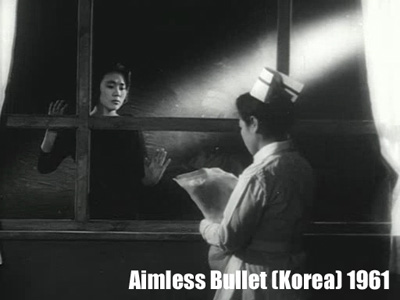 |
Aimless Bullet (Korea) 1961 Yoo Hyeon-Mok’s Aimless Bullet is considered to be the best film ever to come out of Korea by Korean film critics. That is one kind of recommendation. That the Korean government banned the film is what convinced me to see it. Aimless Bullet deals with the disillusionment of Korean soldiers after the war. This isn’t some romantic drama with Alan Ladd and Veronica Lake. It is a realistic and brutal look at men who trading cryptomonede were wounded – one way or another – and living marginal lives in desperate conditions. The print I saw wasn’t perfect and the subtitles looked hand drawn and it’s still a devastating piece of cinema. |
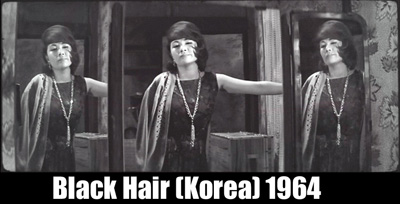 |
Black Hair (Korea) 1964 Yeon-sil is the crime boss’s lover and by various twists and turns she’s betrayed by a lie, disfigured by the gang and tossed into the street to make her living as a prostitute. She’s taken in by a taxi driver who helps her and arranges for plastic surgery for her face while the crime boss’s men decide to kill her so that the boss won’t relent and thus the wheel begins the downhill journey. There are traces of Japanese ‘60s crime films as well as Hollywood postwar crime films, yet it stands as an excellent example of Korean filmmaking in the 1960s with some really nice camera work. Directed by Lee Man-hee and starring Moon Jeong-Suk, Lee Dae-Yeob, DokKo Seong, and Lee Hae-Ryong, among others. |
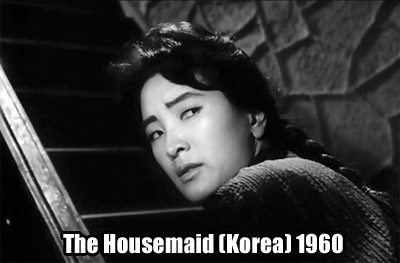 |
The Housemaid (1960) Horror always exploits the new. Korea in the late 1950s entered a postwar economic boon of sorts and an expanded middle class resulted. Housemaids – usually girls from the country – became almost a status symbol or at least that’s part of the legend that surrounds this film that serves as a cautionary tale much like Fritz Lang’s “The Woman In The Window.” Im Sang-soo remade the film in 2010 with a nice budget, a talented cast and a far more theatrical ending. The black and white original seems far scarier being based on a family new to the idea of a household staff and not really knowing what to expect. According to Koreanfilm.org the film was “a consensus pick as one of the top three Korean films of all time.” Written and directed by Kim Ki-young. Starring Kim Jin-kyu, Lee Eun-shim, Ju Jeung-ryu and Um Aing-ran, among others. |
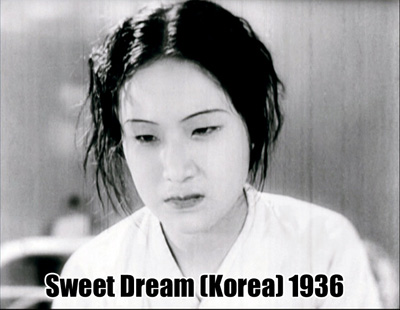 |
Sweet Dream (1936) According to the Korean Film Archive, “Sweet Dream” is “as of 2006, the oldest Korean film for which the film stock still remains.” Typical of films made in the 1930s, whether in Asia or in what was known as pre-Code Hollywood, it tried to define what was then know as the “new woman.” It shares some similarities with Cai Chusheng’s 1935 “New Woman” that starred Ruan Lingyu although it is the differences that make it interesting. Directed by Yang Ju-nam and starring Moon Yae-bong, it is the story of a vain and bored housewife who spends too much money and neglects her family. Her husband throws her out of the house and she goes to her lover living in a downtown hotel who turns out not to be the successful businessman she had been led to believe, but a poor criminal. And there her troubles begin in this melodrama that could easily have been remade in Hollywood starring Barbara Stanwyck. It is far from the brilliance that would mark Korean films decades later and yet in the context of the “new women” in films in the 1930s, a worthwhile entry. |
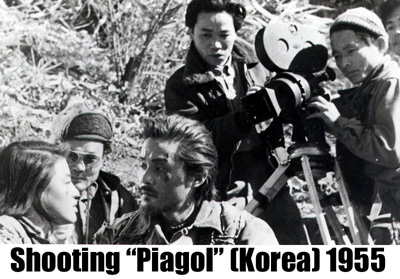 |
Piagol (Korea) 1955 This film was banned for a time by Korean authorities for “humanizing” communists and unlike most propaganda films this film takes place among a cadre of North Korean soldiers who stay behind in South Korea after the armistice for purposes of sabotage and recruitment. No South Korean soldiers or police appear in bucharest escorts the film and that is where the power of the film lives no matter what your personal politics. It is a survival film of sorts that works beyond the film’s original intentions. The major drawback to this film is the absolutely dreadful translation for the subtitles. A case in point: "Step forward, you serious reactionary headman." There are numerous other examples. One of my favorite Korean films and I’d love to see it again (it is streaming on youtube via the Korean Film Archive). Directed by Lee Kang-Cheon and starring Kim Jin-Kyu, No Kyeong-Hee, Lee Ye-Chun, and Heo Jang-Kang, among others. |